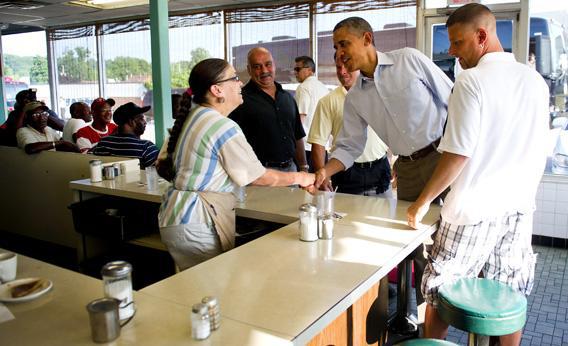A 70-year-old restaurateur, Josephine “Ann” Harris, died of cardiac arrest hours after President Obama stopped at her diner for breakfast last week. Harris, who didn’t know that Obama would visit until shortly before he arrived, was described by friends and family as a big fan of the president. Can people die from being too excited?
Yes. Excitement can trigger heart attacks, cardiac arrest, strokes, and other potentially fatal medical emergencies. Your body reacts to excitement in much the same way it reacts to feelings of fear or stress—by releasing the hormones adrenaline and noradrenaline. These stress hormones trigger what’s known as the fight-or-flight response, which primes people (and animals) to face dangerous situations. However, too much adrenaline and noradrenaline can be dangerous to the heart, brain, and other organs. An enormous shock, whether positive or negative, can cause your heart to speed up, beat irregularly, or stop. In patients with pre-existing heart disease, the fight-or-flight response can also dislodge arterial plaques, sending blood clots to the heart, causing a heart attack, or to the brain, causing a stroke.
All kinds of excitement have been shown to kill people. A Taiwanese man died of a stroke after watching Avatar. One study showed that soccer fans in Munich experienced higher than normal rates of cardiac emergencies during Germany’s games in the 2006 World Cup. Orgasm can trigger fatal heart attacks, as can unexpected personal triumphs: One man died after sinking a hole-in-one in golf; another passed away after bowling a perfect game. (Doonesbury cartoon character Dick Davenport died after seeing a vanishingly rare Bachman’s warbler.) Newspapers sometimes report on tragic deaths of young people apparently triggered by excitement, like the boy who experienced an asthma attack and then heart attack while opening birthday presents, or the British teenager who had a burst aneurysm while traveling in Thailand. However, death from excitement is exceedingly rare, especially among otherwise healthy people. (Harris was known to have had heart disease.) More common are medical emergencies triggered by negative emotions like stress, fear, or sadness, such as “voodoo death,” a term used to describe death caused by fear of supernatural punishment, and “broken-heart syndrome,” a cardiac abnormality triggered by sadness or emotional trauma.
Before medical science allowed coroners to pinpoint the cause of death, newspapers sometimes attributed people’s deaths to excitement; for instance, an 1884 New York Times story reported that the “wife of Aaron Marks, a well-known clothier, died very suddenly from excitement occasioned by a disturbance in the store.”
Got a question about today’s news? Ask the Explainer.
Explainer thanks cardiologist Maryjane Anna Farr of New York Presbyterian Hospital and neurologist Martin A. Samuels of Brigham and Women’s Hospital’s Department of Neurology in Boston, Mass.
